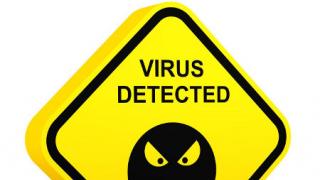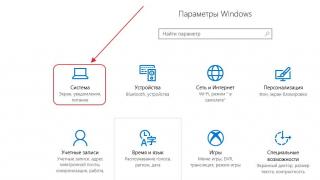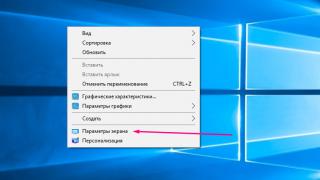On this page, all the lessons of the site are ordered exactly in the order in which we advise you to take them. Unfortunately in this moment there are gaps in the list of lessons that will be filled in without fail. Topics for which there are already articles are links (highlighted in blue with underlining) - follow them and learn! The list does not include news and some articles (for example, on solving computer problems). they do not make sense for training, however, you will receive them if you subscribe to the newsletter.
You can freely write your wishes in the comments, this is strongly encouraged... The proposed topics are included in the outline of the articles.
Let's build the best free step-by-step tutorial together!
Target: create a list of articles on the site, studying which in a certain order, you will begin to feel free when working at a computer.
Important! If you can write an expert article on any of these topics, email us, articles are paid.
Course: Computer User - A basic level of
- What is a netbook
- What is an ultrabook
- What is a tablet
- What is a Tablet PC
- USB port: what is it and what can be connected through it
- How to turn on the computer, what is happening at this moment
- What is a driver. What is the graphical shell of the operating system
- Computer desktop.
- Mouse, cursor, how to work with the mouse.
- What is a shortcut, file, program, folder.
- Basic file types. What is an extension
- What's happened HDD and how it works ( On publications)
- Computer hard drive, partitions.
- Keyboard. How to work with her. Create a text file.
- Start menu, what's in it
- Shutting down the computer. ( In work)
- What is hibernation, when to use it
- What is standby mode, when to use it
- Installing the program. The main stages of the installation of any program. Where it will appear, how to find where it is installed, how to find it in the Start menu.
- We work with the program. Standard program elements: settings, drop-down menu, quick access panel.
- We create a shortcut. All ways.
- How to see the characteristics of your computer.
- Computer screen. Resolution, settings, change the desktop theme.
- How to install a driver for a device. Where to download the driver if it is not installed automatically. ( In work)
- Computer startup. How to disable a program from startup. How to disable startup in the program itself. ( In work)
- What is an archive. Working with the archiver program
- How to open a video on a computer
- How to open e-book(.pdf .djvu .pdf) ( In work)
- How to open a presentation
- How to open a document (.doc, .docx, .fb2)
- How to find out which video card I have
- Blue screen of death - what is it
- What is BIOS and what is it for
- How to open .pdf
- How to open.mkv
- .Djvu file extension
- On-screen keyboard - what is it and what is it for
- How to change the language on a computer
- Hot Windows keys 7,8
- How to enlarge the font on a computer
Course: Computer Security
- How to set a password on Windows
- How to come up with a complex password
- How to protect your Google account
- What is antivirus
- What is a firewall
- How to block pop-ups
- How to make file extensions visible in Windows
- How to protect yourself on the Internet using the WOT extension
- Overview of Kaspersky Anti-Virus
Course: Computer Programs
- Punto switcher
- Alarm clock to computer
- Video maker from photos
Course: Google Services
Course: Computer User: Intermediate
- How to create virtual machine(virtual computer)
- How to transfer old photos to your computer
- How to put a password on a folder
- How to clean the Windows registry
- How to enter BIOS
- How to format a hard drive
- How to make defragment hard disk.
Course: Laptop and Netbook User
- Features of working with a laptop and netbook
- Laptop device, netbook
- Laptop and netbook keyboards - features of work
- How to extend battery life
- What to do if the laptop (netbook) gets warm
- Computer stands: cooling and not very.
- How to turn on WiFi on a laptop
Course: Computer and "near-computer" devices
Course: Computer and Child
- Do I need to limit the time at the computer for children and how to do it correctly?
- What can a child learn at the computer
- How to protect your child from adult sites
Course: Internet User - Basic Level
Only a few decades separate us from the time when electronic computers occupied entire halls, and the people who worked for them were considered almost geniuses. How could you not get confused in hundreds of thousands of wires and terminals ?! Then none of us could have thought that some twenty years would pass and computers would become personal, that they would appear in our house and, moreover, would become an integral part of our life. The number of computer users is growing day by day. Of course, none of them pretend to be a software engineer, but everyone in whose house a personal computer "lives" certainly does not consider himself an amateur in relation to his electronic friend.
Yes, indeed, for many, a computer is a reliable friend. With its help, people at a rapid pace learn the world around them, gain knowledge, and reach new heights. For some, a computer has become simply necessary as a working tool. Life has brought you and me to such a simple conclusion: if we want to realize ourselves fully, we must own computer literacy... Lack of skills computer user is often perceived as a disadvantage. Although voices are increasingly heard comparing the computer to trojan horse... They argue that a person is simply not able to assess the danger posed by computerization, that he cannot take into account the incredible speed of technological improvement of machines. For example, in Japan there is already a computer that is capable of performing 300 billion operations per second, and very soon a machine with a speed of 1 trillion per second will appear. Many people still believe that the computer is a dangerous invention, which by its artificial intelligence can affect human consciousness. But even they can't deny simple truth: the computer has firmly entered our life, and behind it is the future of mankind.
The current situation requires us to be certain in our attitude to technology, intellect and creativity. Remember Isaac Asimov's Three Laws of Robotics? "Think about how to maintain the location of your creation, and not lose the status of its creator." Of course, many of us don't even think of such thoughts. We would like to get basic knowledge about working with a personal computer so that we do not have an inexplicable fear of this smart machine. But believe me, in order to become an ordinary, ordinary, and then experienced user personal computer, no ingenious intellectual ability is required.
In the pages of this book in a simple and accessible form set out all necessary knowledge for novice users. We promise: from the very first page, your awe of the PC will begin to dissipate, and on the fifth or sixth it will disappear completely. You will see that there is nothing difficult in communicating with a computer that even a child preschool age can master it with ease. The book describes the sequential stages of getting to know a computer, starting with its device and practical advice when buying it. With the help of the book, you will learn how to work with basic programs, text, graphics, photographs, music files, you will learn how to burn CDs and DVDs, go online, and besides that, you will get a lot more useful tips and necessary information... You will soon be surprised to realize that you have become confident user your personal computer. Good luck, dear reader!
What is a computer
Maybe you think you have a good enough understanding of a machine like a computer. But do not rush to skip the first chapter, especially if you are a novice user of a personal computer. You can bet that a lot of the information that you glean from this chapter will be useful to you and even useful.
We'll start with the etymology of the word "computer". It comes from the English "compute", which means "calculation". But the functions of a computer are not only contained in electronic calculations, like a calculator.
Opportunities electronic machine hundreds of times wider and at rapid development new technologies are growing every day. A computer can perform operations not only with numbers, but also with any information - text, sound or graphic image... Of course, all this is preliminarily translated into digital form... A computer, in addition to everything, can formulate commands and, with their help, control various external devices- monitor, printer, speakers, etc.
You think you know what a computer looks like, but the device you purchased and installed on your desk is far from the only member of the computer family. In reality, there are already a great many such smart machines. And interestingly, most of them are outward appearance they are not at all similar to the personal computer familiar to our presentation. It is impossible to name any branch of industry or sphere of human activity, where a computer would not be used in one form or another. It was with his help in modern world fly planes, cars, submarines, spaceships... Only such computers are called special computers.
In everyday life, of course, they use completely different computers, which are usually called personal computers - PCs, and the English abbreviation for such machines is PC. There are handheld or pocket computers - PocketPC, PalmTop, portable - laptops. And in this book it will be about desktop personal computers(fig. 1).


Rice. 1. Types of modern personal computers: a - pocket computer; b - laptop; c - desktop personal computer
You've probably heard of IBM-compatible desktop personal computers. IBM is the name of a well-known company that produces personal computer equipment. In the recent past, IBM products were the most popular and widespread in the computer market. Currently, the computers of this company have practically disappeared from sale, but the concept of IBM compatibility still sounds relevant. At the dawn of the computer era, most manufacturers kept all the components of their machines in the strictest confidence. This was called the principle of closed architecture. And IBM, unlike others, provided information about components to everyone and, moreover, appealed to competitors to also use the principle of open architecture and produce similar computers with similar components. IBM takes the lead in the market computer technology and has enjoyed the unlimited trust of consumers for a long time. Gradually, experts from other manufacturers appreciated the advantage of IBM-compatible models, mastered their production and began to develop their own options for components, which often turned out to be best quality than the products of the company that gave birth to modern PCs. Thus, the products of IBM were very quickly ousted from the market by competitors. Only the name of the company continues to live, since computers of modern well-known firms still referred to as IBM-compatible.
All desktop and laptop PCs that exist today are IBM-compatible. Exceptions are computers Apple, but in our country they are used only in the printing industry, and that is extremely rare. Initially, there were no IBM-compatible handheld computers, but Lately modifications have been developed that allow you to install a reduced version of Windows.
The new edition of the popular computer encyclopedia includes the most up-to-date information required by every computer owner. The detailed presentation of the material, combined with a lively and exciting author's style, make the book indispensable for both beginners and experienced users.
How to choose the right computer and what programs to use? How easy is it to install and master Windows 7? How to work in Linux? How to deal with errors and make the system stable. How to quickly find necessary information on the Internet and use file-sharing systems? The book will answer almost any question that a user may have, and will become your reliable friend and companion.
Having withstood more than ten reprints, " Newest encyclopedia computer ", is still the most popular self-instruction manual for computer literacy in Russia.
"This book is mainly about the hobbits ...". It was with this phrase that Professor J.R.R. Tolkisn began his hefty saga of The Lord of the Rings. However, the professor miscalculated: after his fur-legged favorites, so many different-sized animals seeped into the pages of his opus that the stunted hobbits among them somehow immediately got lost ...
So it happened with computers - for nothing that our encyclopedia is nominally dedicated to them, but on the way to the computer itself, we have to wade through a dense forest of players, mobile phones, smart washing machines and video cameras ... Which with all their displays will convince us that they are the main characters of the book ...
But we, following the example of the professor, will pretend that we do not notice all this variegation and diversity. Once we have agreed to write about computers, we will write about them. And in order for the reader to solidify this indisputable fact thoroughly, you and I need to devote the first pages to a detailed and thorough description of the main characters of our book, their characteristics and habits.
In order to finally separate the egg from the chicken, and the head of the clan from his many relatives, let's figure it out once and for all - what is a Computer? And where did it actually come from, and when did it happen?
Content
About this book
How did the computer come about?
How did the computer come about?
Computer device
The "platform" of your computer
CPU
Motherboard
Information output devices
Information input devices
Information pantries
Control devices
Power management devices
Networks and communications
Choosing a laptop
Gadgets
Operating system
Microsoft operating systems
The "right" operating systems
Installing Windows from A to B
Getting Started: Our First Steps
We work with Windows 7
Controls
Interface
Appearance and personalization
Files, folders, Disks. We work with documents
Working with programs
Setting up "Iron"
Protection and security
Accounts
Working with mobile devices
We work with networks
Setting up an Internet connection
We work with the Internet
Walk the Net: Browser
Programs Windows family Live
Your multimedia center: Sound, photo, video
Windows standard programs
System Repair and Restore: Crash Protection
Diagnostics: Resource Monitor. Event logs
Basic optimization techniques
Overclocking school: gigahertz for free
Remote desktop control
System Restore
Recovering lost information
Meet Ubuntu Linux
Windows + Linux. Installation using the wubi program
Setting up Ubuntu after installation
GNOME desktop
Installation and removal of programms
Running Windows programs under Linux
We work in Microsoft Office 2010
Microsoft Office Live
Microsoft Word
Microsoft Excel
Microsoft Outlook
Microsoft OncNote
Microsoft PowerPoint
Microsoft Publisher
Not only Microsoft Office: popular office programs
Alternatives to Microsoft Office
Spellchecking
Working with PDF documents
Translators and dictionaries
Electronic dictionaries
Scanning and recognition
Electronic archives and search engines
Keyboard switches
Your media library: Photo, Music, Cinema
Digital photography
"Music box": MRZ and others
Cinema hall on the computer
Reading room: computer library
Internet
First steps on the web: portals and search
E-mail (E-mail)
QIP: universal communicator
Skype
Blogs: Web Blogs
Social networks
Online dating: communication, love, flirting
Music and video on the web
The alphabet "kakalytsyk". Movies, books, music on the web
Shopping on the internet
Applications
50 best free software
Computer History: Timeline
Who's Who in Computer History
This day in computer history
Free download e-book in convenient format, watch and read:
Download the book The newest computer encyclopedia 2011, Leontyev V.P., 2010 - fileskachat.com, fast and free download.
Download pdf
Below you can buy this book on best price with a discount with delivery throughout Russia.



